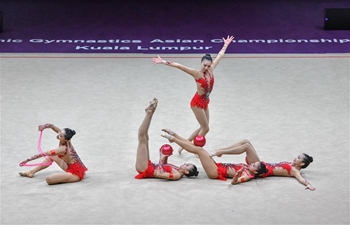LONDON, May 1 (Xinhua) -- The research led by the University of Birmingham has revealed that healthy older people who exercise regularly are less likely to experience a "tip of the tongue" moment when it comes to remembering things.
The study, the first of its kind to investigate the relationship between aerobic fitness levels and temporary cognitive lapses, showed healthy older people who exercise regularly are less inclined to struggle to find words to express themselves.
People in a tip-of-the-tongue state have a strong conviction that they know a word, but are unable to produce it, and this phenomena occurs more frequently as people grow older.
The Birmingham study, carried out in collaboration with the University of Agder in Norway, the University of Leuven in Belgium and King's College London, measured the occurrence of tip-of-the-tongue states in a psycholinguistic experiment.
The study saw a group of healthy adults with average ages of between 67 and 70 being compared in a "tip-of-the-tongue" language test to young people in their early 20s.
They were asked to name famous people in Britain, such as authors, politicians and actors, based on 20 questions.
The participants also underwent a static bike cycling test to quantify their ability to consume oxygen and their resulting individual aerobic fitness levels.
Lead author Dr Katrien Segaert, of the University of Birmingham's School of Psychology, said: "Older adults free from medical diseases still experience age-related cognitive decline.
"Significantly, what we found was that the degree of decline is related to one's aerobic fitness. In our study, the higher the older adults' aerobic fitness level, the lower the probability of experiencing a tip-of-the-tongue state.
"Importantly, our results also showed that the relationship between the frequency of tip-of-the-tongue occurrences and aerobic fitness levels exists over and above the influence of a person's age and vocabulary size."
Segaert added that older adults sometimes worry that tip-of-the-tongue states indicate serious memory problems but this is a misconception
"Tip-of-the-tongue states are not associated with memory loss. In fact, older adults usually have a much larger vocabulary than young adults. Instead, tip-of-the-tongue states occur when the meaning of a word is available in our memory, but the sound form of the word can temporarily not be accessed."
She said she hoped the study would add weight to public health messages that regular exercise is important to ensure healthy ageing.
The research has been published in the latest edition of the journal, Scientific Reports.

















